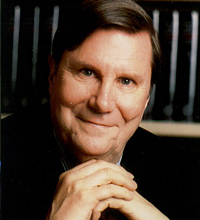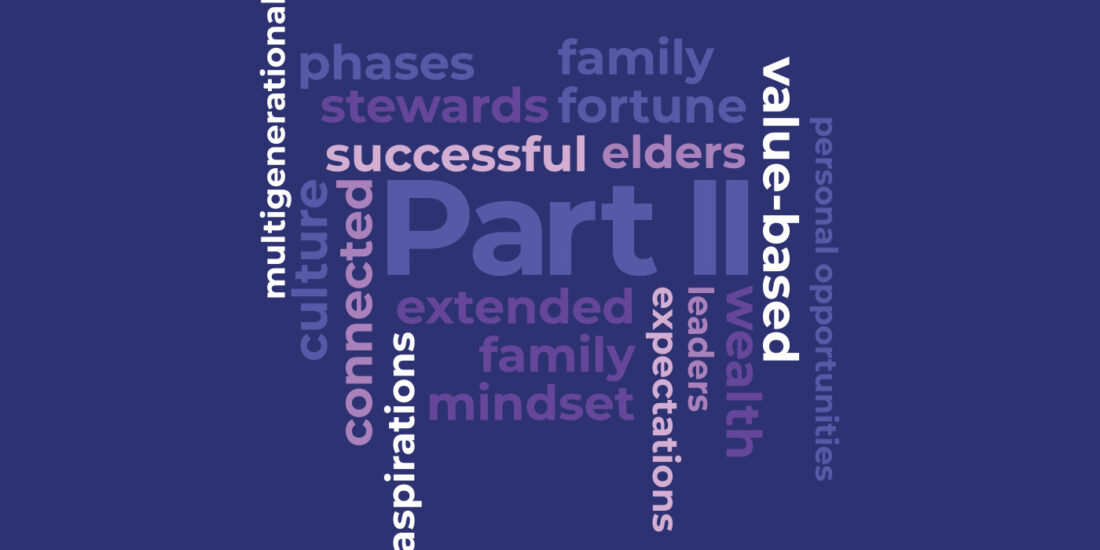This week’s issue is an interview with the distinguished Jay Hughes who discusses key elements of his new co-authored book, The Voice of the Rising Generation: Family Wealth and Wisdom. Many thanks to Jay.
The Practitioner: Your new book, The Voice of the Rising Generation: Family Wealth and Wisdom, is organized in part around the famous epic poem, “The Odyssey.” Can you tell us why you thought this poem was a good framework for furthering our thinking on family wealth?
JEH: My co-authors, Keith Whitaker, Susan Massenzio and I used the poem “The Odyssey” as a structural backbone for the book because it is the story of Odysseus’s son Telemachus’ journey from boyhood to manhood. Telemachus, as the son of a founding family hero, is a perfect example of a member of a family’s Rising Generation, inert in the vortex and thus captive of his father’s dream. He is unable to act independently as a man. Still a boy, he has not gone on the adventure he needs to individuate and then to discover and bring his own dream to life. This is the path that all Rising Generation members must follow if they are to become who they are meant to be — not simply someone’s son or daughter. Thus “The Odyssey” offers a metaphor for the journey to adulthood of a boy to man, Telemachus, not the journey of Odysseus’s son, and for the journey each of us must go on to become whom we are meant to be.
The Practitioner: It seems like you may have coined a new term for the field with your use of “the rising generation.” How is this different from the “next generation” and why did you make this choice?
JEH: My co-authors and I have long felt that the term “next” as applied in families to human beings was pejorative and diminishing — rather than complementary and enhancing. To be “next,” particularly if the “prior” was heroic or worse inert or grandiose and self involved, is to be in a deeply one down place. The term “rising” we believe contains affirmative possibility and connotes growth and useful evolution. To be part of a generation that is “rising” is to have dawn as one’s goddess with all the possibilities of creation and generativity in front of you. It is to be as far as one can be from “setting” and the suffering the shirt sleeves proverb ordains.
The Practitioner: In the book you talk about “…the founder’s sun becoming the black hole” of the rising generation. What do you mean by this?
JEH: My co-authors and I wrote this book to try to describe to ourselves why so many of the so called second generation family members we encounter are so often people who have not manifested their own dreams. Why they seem to be defined by Munch’s painting the “Scream.” We realized that very often in such families the so called “founder,” during his or her life does a god-like act by making a dream, which is by definition immaterial, material. In this universe this should be impossible for a mortal to do — yet in our field it is normative. Once we realized that this is the creative process and its result, we realized that these dream metaphorically become suns, just as energy becomes matter and manifests as a sun in our universe. We then realized that every sun in this universe must ultimately end its life and go back to energy in one of two ways. It can blow up as super novas do or it can collapse into a black hole. Given the enormous power of the materiality of the founder’s dreams, we saw that most of the time they do not blow up but rather become black holes, energy forces so vast that anything in their hidden gravitational fields is pulled into them and destroyed by them. We believe that many families who fail to avoid the shirt sleeve proverb are destroyed by such black holes.
The Practitioner: You also discuss “elders and mentors.” Can you explain to our readers what the difference is and when someone from a rising generation might be looking for one or both as a source of guidance?
JEH: In a paper I wrote called “A Reflection on the Art and Practice of Mentorship,” I defined elders and mentors along with teachers, coaches and best friends. The paper can be found at www.jamesehughes.com, under the icon, Articles. Here I will say that Elders are wisdom keepers, story tellers, exemplifiers of the family lineage, leaders of the ritual journeys of their family members’ stages of life and transitions, leaders of their families’ ceremonies marking the successful completions of those stages of life; members of their family’s council to mediate its disagreements; above all to do and to maintain the families’ seventh generation thinking.
Mentors choose us when we choose them to learn something that is crucial to the stage of life in which we are and to its lessons and eventually to its transcendence. Thus Dante discovers Virgil to help him through Inferno and Purgatory to find Beatrice on his journey of spirit, and thus Telemachus is guided by Athena on his journey to manhood and self awareness from his current status as an immature unawake boy.
The Practitioner: As you note in the introduction, you’ve been working in the family wealth field for a long time and have authored a number books, made countless presentations, and advised hundreds of families. From this perspective, what advice would you have for the 5000 advisors and consultants who make up The Practitioner’s readership?
JEH: Advice? I doubt I can offer any that would be useful as I am, as is each of you, simply a fellow pilgrim on the same journey as a serving professional to Canterbury, Santiago, Rome, Benares, Jerusalem, Mecca, Kailash. Dun Huang, Kyoto and all the sacred places of renewal of human spirit.
I can observe that wisdom keepers down through the ages have taught that a fulfilled professional life lies in the “qualitative” process work of relief of another’s suffering and enhancement of his or her journey of happiness — in our specific field to the awakening of every Rising generation member and to assisting him or her in the manifestation of his or her own dream and of his or her individuation. This is a life of service and secular priesting. What I have called in my writings the life of a personne de confiance. It is the path of the master. Necessarily it is the path less taken which as Frost tells us “makes all the difference” in our own suffering or awakening.
Such a life does not lie in a life devoted to “quantitative” effort to develop products to grow the deceased Founder’s dream as that path leads only to the advisor finding him or herself in the black hole resulting from the inevitable collapse of the Founder’s dream. This is the path of the personne d’affaires and of the expert. Sadly for the suffering of the professional, this is the professional path in modernity and it has lead to the lowest morale ever recorded in the professions. We suffer because we give up our vocation for techne.
I can also observe that seeking to help a family avoid the suffering the shirt sleeves proverb ordains for them requires helping them grow themselves, their human, intellectual, social and spiritual selves, supported by their financial self, while assuring that they are never lead, or worse, driven by this last self.
Finally I can observe that to do this work requires vocation, without it we risk being in the illusion of our own expertise and we are likely to do harm. With it we will always begin every assignment with a beginner’s mind committed to doing no harm while gently hoping we might do some good. We hasten slowly, seek with Big Mind and Big Heart to comprehend the vast complexity of a family’s self and seek to grow that complexity toward higher functioning and fusion and away from the fire of the chaos of fission or the absolute cold of the inertia of loss of self and cohesion.
About the contributor:
 James (Jay) E. Hughes, Jr. is the author of the acclaimed classic Family Wealth and Family: The Compact Among Generations, and the co-author of The Cycle of the Gift: Family Wealth and Wisdom. He has also written numerous articles on family governance and wealth preservation. Jay is a frequent speaker at symposia on the growth of families’ human, intellectual, social, spiritual, and financial capital. He will receive Fellow status at the global conference in October. Jay can be reached at jehughes@jehlaw.com.
James (Jay) E. Hughes, Jr. is the author of the acclaimed classic Family Wealth and Family: The Compact Among Generations, and the co-author of The Cycle of the Gift: Family Wealth and Wisdom. He has also written numerous articles on family governance and wealth preservation. Jay is a frequent speaker at symposia on the growth of families’ human, intellectual, social, spiritual, and financial capital. He will receive Fellow status at the global conference in October. Jay can be reached at jehughes@jehlaw.com.





